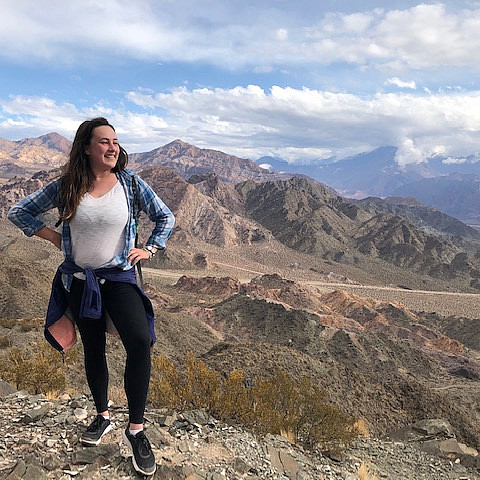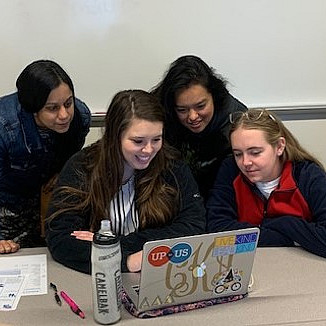News
Life after Southwestern
October 15, 2020
October 15, 2020
Open gallery

I have no clue what I want to do after I graduate from Southwestern University. I can’t imagine what my job or my life will look like. I haven’t lived enough, learned enough, and experienced enough to decide what I want to be when I “grow up.” However, I find comfort in the fact that no one really knows what they’re doing. We’re all making it up as we go.
In the past, I’ve considered life to be a linear journey. First, you complete high school and college soon after. You then immediately begin your career, start a family, and so on and so forth. But life isn’t a direct, constantly flowing course but rather a vast system of tributaries interconnected with seemingly random deviations, until it feeds into an expansive ocean of endless possibilities and prospects. The going can be turbulent or stagnant, but unrelenting forward motion prevails in the end.
Since the onset of the COVID-19 pandemic, many people are encountering obstacles and complications they’ve never faced before, including students. It was difficult to imagine what life after college looked like before, but now it is even more so as we wonder what awaits us after graduation. This curiosity led me to interview three exceptional Southwestern alumni who have recently entered the workforce or graduate studies. With their help, I’ve been able to formulate a general idea of what to expect of my life after SU.
Ellie Crowley ’19, bachelor of arts in business with a Spanish minor
“It feels like I’m in the right spot, and I couldn’t ask for more.”
In Ellie Crowley’s case, a multidisciplinary education has led to the beginnings of a multidisciplinary career. During her time at Southwestern, Crowley realized a passion for business as well as art, and she decided to pursue both in her graduate studies. This fall, she began pursuing her master’s degree in arts leadership and cultural management at Colorado State University and is currently attending class online because of the conditions surrounding the pandemic.
Initially, Crowley intended to move to Colorado and begin her graduate studies in person, but she instead had to adjust her path and mindset. She is now working a full-time position at Esd & Associates, a marketing firm in San Antonio, where she is a copywriter and digital content creator.

And what does she plan to do in relation to her degree? “To be able to take business lingo and apply it to the arts, something that I care about so much—that’s where I want to go with it,” she says. “That realization came from being at Southwestern, where I was allowed to explore business, art, and everything in between.” Crowley feels that she would be satisfied in many different roles, but what she is greatly concerned about is being able to incorporate as many of the things she’s passionate about, which include not just business and art but also social justice. Having supported the Coalition for Diversity and Social Justice (CDSJ) at Southwestern while she was a student, Crowley recognizes her responsibility to be cognizant of social issues and do her part to advocate for change. At this point, she strives to have a career that fulfills her passions and also aligns with her values.
Since graduating, Crowley has achieved much in her academic and professional careers. However, she emphasizes the importance of her growth as an individual. Despite the hardships of disrupted plans caused by an ongoing pandemic and overwhelming work assignments, she has become confident in her abilities and has found empowerment in her newly realized voice and capability.
Kari Darr ’20, bachelor of arts in art (studio) with a focus in ceramics and a bachelor of arts in art history
“I still don’t know what I’m doing. That’s the thing about being an artist: you don’t have a set path.”
When the Southwestern campus closed as COVID-19 spread across the country,
Two businesses that Darr has worked with are an online plant store in which they were able to sell their pots and an apothecary in Austin in which they are excited to sell altar accessories such as mini altar bowls, incense holders, and stickers. These partnerships coupled with commission work they create for their business facilitate a shift to a more inclusive mastery of the arts as they experiment by creating using new mediums, such as a pair of earrings currently in the works. In addition, they continue to apply to have their work displayed in galleries and have already been accepted into a few, such as the Charlie Cummings Gallery, located in Florida.
Darr classifies their artistic style as “very clean and precise” and “almost mechanical and retro-futuristic.” They attribute the development of their style to their ceramics professor, Ron Geibel, and the information necessary to being accepted into galleries to the fine arts school. According to Darr, not all artists are knowledgeable about the process of applying for and entering galleries. “Southwestern gave me training for the professional side of being an artist,” they share, “and I think that’s really valuable.”
Mike May ’20, bachelor of science in physics with a minor in mathematics
“It’s a matter of not letting our expectations ruin the reality for us.”
Mike May admits that when his junior year came around, he was still just as clueless about what he wanted to do as he was during his first year. But after completing research projects with King Creativity, collaborating with classmates, and exploring different disciplines with the help of his professors, he decided to apply for Ph.D. programs in engineering. He is now a graduate student at Dartmouth College’s Thayer School of Engineering. In addition to taking classes at the university, he also has a fellowship with the U.S. Army’s Cold Regions Research and Engineering Laboratory, where he conducts Arctic research. My subpar understanding of science aside, he explains that sea ice is subject to a lot of stress that determines where it fractures. He is assisting in the development of sensors that will measure pressure in ice floes to determine their stress state, which will help predict future fractures in the ice for military application.
“Learning material, then applying material”—this is how May describes the nature of his studies and fellowship. The majority of his time is spent split between two tasks: reading literature in order to familiarize himself with the field and creating a piezoresistive force sensor network. This mass network of sensors will be frozen into the ice, making it possible to receive scientific readings via radio wave. In layman’s terms, he will be learning how to code and integrate the sensors.
Initially, May applied to graduate school in multiple disciplines, but after visiting Dartmouth and interviewing for his current fellowship he knew that was where he wanted to be. A significant deciding factor was the ability to go and do remarkable things, rather than sit in a lab and just do research. A precursor to this experience is when he was invited to go on a day long research trip into the mountains of Alaska with his Dartmouth advisor. This trip, along with the knowledge that he would potentially have the opportunity to go to national conferences, work with researchers from around the globe, and do field work in the arctic circle, was enough to convince him that the Dartmouth program and the fellowship with the army was the path he wanted to pursue.

My Conclusion
The going has been rough. There’s no denying that. To sum up the nature of these past six months’ events, we are operating at the bottom of Maslow’s Hierarchy of Needs. Maslow’s theory is based on a pyramid that is composed of five different levels of needs, with basic needs such as food and shelter at the bottom and self-fulfillment at the top. In order to reach the higher levels, we must first satisfy the lower levels. We are stuck in the second lowest tier, security and safety. How are we expected to aim for the moon while we’re stuck on Earth, wondering whether we or our loved ones will get sick or be affected by the tumultuous goings-on of daily life?
Strength, however, is not proven during times of prosperity and ease but instead during times of hardship and uncertainty. At some point in the future, I might be expected to perform work out of my comfort zone, initiate and support my own business ventures, or build a piezoresistive force sensor network. Actually, maybe not that last one. But the fact of the matter is, based on these three individuals’ accounts, I know that success is still attainable, growth is yet achievable, and while life is tough, so are we.
It is said that difficult roads lead to beautiful destinations. Despite the trials and tribulations, what is waiting for us at the end of this journey will be made that much sweeter by our resilience, determination, and faith in ourselves.
















